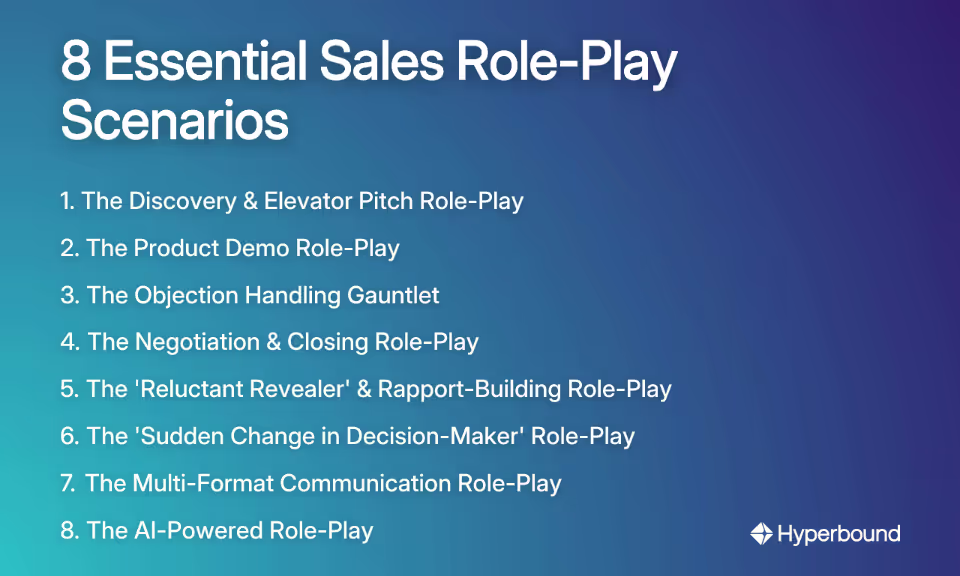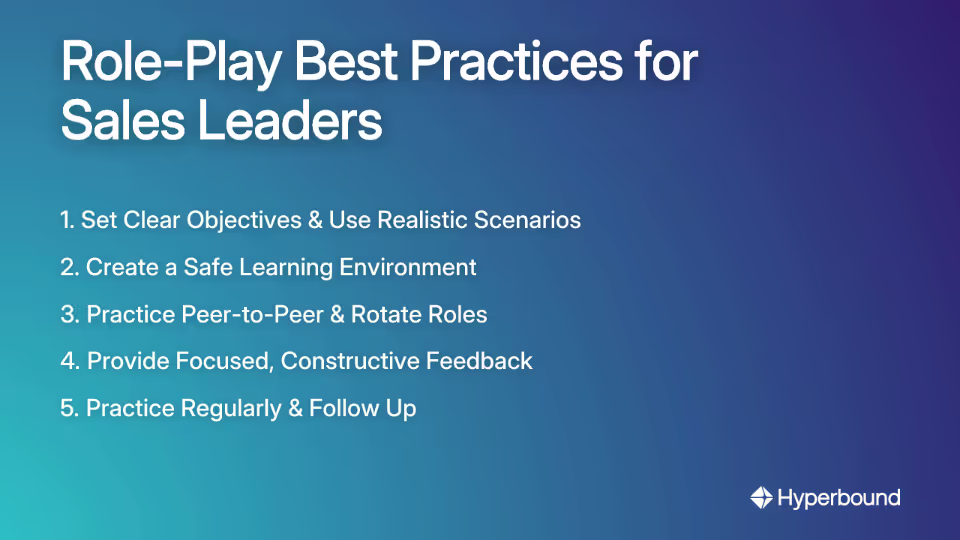.avif)
You've been there before: sitting awkwardly across from a colleague during a mandatory sales role play session. They're playing the world's most unresponsive prospect, giving one-word answers and unrealistic objections. Meanwhile, your manager watches with a critical eye, only to conclude: "You're talking too much."
No wonder so many sales professionals dread role-playing exercises. As one frustrated rep put it: "Not very useful, because most people don't know how to do it properly." Another lamented that "you can't recreate a live customer meeting because there's so many factors that go into how a conversation goes."
The truth? Most sales teams are either avoiding role play entirely or executing it so poorly that it becomes a waste of time. Some teams don't receive any practical training at all, with reps wishing "we were even taught how to handle objections."
But here's the surprising reality: When structured correctly, role play is one of the most powerful tools in your sales training arsenal. Research shows that role play has a 75% knowledge retention rate, compared to just 5% for lectures and 10% for reading. Even more impressive, consistent role-play training can improve sales performance by up to 30% and boost self-perceived confidence by 20%.
This article moves beyond generic advice to provide 8 specific, scenario-based role-play exercises designed to build confidence, sharpen critical skills, and ultimately help your team close more deals.

Foundational Role-Plays: Building Your Core Skills
These essential kinds of role play exercises should be mastered by every sales rep, from new BDRs to seasoned account executives.
1. The Discovery & Elevator Pitch Role-Play
Goal: Master the first impression by refining your elevator pitch and honing discovery questions to uncover true buyer problems.
Why It Matters: This foundational skill is crucial for BDRs. Sales research notes that 82% of buyers accept meetings after a series of contacts that begin with a cold call, making this first step vital.
Scenario: One person plays the sales rep delivering a 30-second elevator pitch or initiating a discovery call. The other plays a busy prospect who has only a few minutes of attention to give.
Focus Areas: Practice refining talk tracks, asking probing questions to identify pain points, and conveying a compelling value proposition quickly.
2. The Product Demo Role-Play
Goal: Deliver a confident, value-driven product demo that goes beyond features to solve customer problems.
Why It Matters: Reps must demonstrate deep product knowledge and convey precise messaging under pressure.
Scenario: The rep conducts a demo for a "Feature Fanatic" prospect who is fixated on a specific feature your product lacks.
Example Script:
Prospect: "This looks good, but I absolutely need a solution with [specific unavailable feature]."
Sales Rep: "I understand why that feature is important. While we don't have that specific function today, many of our clients use [alternative feature] to achieve a similar outcome. Let me show you how. That feature is also on our product roadmap for Q4."
Focus Areas: Managing expectations, pivoting conversations back to value, and showcasing deep product knowledge.
3. The Objection Handling Gauntlet
Goal: Build resilience and develop instinctive, confident responses to the most common sales objections.
Why It Matters: This directly addresses a major training gap identified by sales reps. Mastering objection handling can lead to 20-45% higher win rates in negotiations.
Scenario: A rapid-fire exercise where one person (the "customer") throws out a series of common objections (price, competitors, timing, authority) and the rep must handle each one calmly and effectively.
Example Script:
Prospect: "Your competitor offers a 25% discount. Can you match that?"
Sales Rep: "I understand that you're looking for the best possible value. While I can't match that exact discount, our pricing reflects a comprehensive solution that includes [mention key differentiators like support, onboarding, specific features]. Let's break down the total cost of ownership and the ROI you can expect."
Focus Areas: Composure under pressure, logic-based persuasion, and reinforcing product value.
4. The Negotiation & Closing Role-Play
Goal: Practice navigating the delicate final stages of a deal to secure commitment without giving away unnecessary concessions.
Why It Matters: This is where deals are won and lost. It's an essential skill for every closer.
Scenario: The prospect is ready to sign but introduces a final hurdle. Use the "Deadline Pusher" persona who needs an unrealistic implementation timeline.
Example Script:
Prospect: "I need this solution fully implemented in two weeks, otherwise the deal is off."
Sales Rep: "I appreciate the urgency, and we're committed to getting you up and running as quickly as possible. A quality implementation is key to your long-term success. Let's work together with my technical team to map out an expedited timeline that ensures we hit your critical goals without cutting corners."
Focus Areas: Negotiation techniques, managing expectations, and confidently setting the next steps to close the deal.

Advanced Role-Plays: Mastering Complex Situations
These more nuanced kinds of role play scenarios test a rep's adaptability, emotional intelligence, and strategic thinking.
5. The "Reluctant Revealer" & Rapport-Building Role-Play
Goal: Develop skills to build trust and encourage a guarded prospect to share critical information.
Why It Matters: This scenario acknowledges that sales is "1 part science, 1 part art" and focuses on making the prospect feel "comfortable, trusting & motivated to act," as one experienced sales professional noted on Reddit.
Scenario: The prospect is hesitant to share their budget, key pain points, or the true decision-making process. The rep's goal is not to sell, but to build enough trust to open them up.
Focus Areas: Active listening, empathy, asking open-ended questions, and demonstrating genuine curiosity.
6. The "Sudden Change in Decision-Maker" Role-Play
Goal: Practice adapting the sales approach to win over a new stakeholder who enters the process late.
Why It Matters: This is a common and dangerous deal-staller. The ability to maintain momentum is critical.
Scenario: The rep's champion says, "This all looks great, but I need to get my new boss's approval before we can proceed." The rep must now re-engage and re-sell the entire value proposition to a new, uninformed decision-maker.
Focus Areas: Adaptability, stakeholder management, re-running the discovery process concisely, and quickly re-establishing value.
7. The Multi-Format Communication Role-Play
Goal: Sharpen communication skills tailored for different channels, particularly voice-only and text-based interactions common in remote selling.
Why It Matters: Effective selling in a virtual world requires mastering different formats beyond face-to-face meetings.
Scenario A (Voice-Only): A phone-based role-play where the rep must handle a complex negotiation or objection without any visual cues.
Scenario B (Text-Based): Simulate an email or LinkedIn message exchange to re-engage a prospect who has gone cold. The focus is on crafting compelling, concise, and persuasive written copy.
Focus Areas: Developing verbal persuasion and listening skills (voice-only); enhancing written communication and response strategies (text-based).
8. The AI-Powered Role-Play
Goal: Leverage technology for scalable, personalized, and data-driven practice with instant feedback.
Why It Matters: AI tools solve the problem of biased or unhelpful peer feedback by providing objective analysis on tone, pace, filler words, and confidence. These platforms can dramatically accelerate skill development, with some companies cutting training and certification times by up to 90%.
Scenario: A rep uses an AI-powered platform like Hyperbound, Yoodli, Quantified.ai, or PitchMonster to practice their pitch against an AI persona. After the session, they review a detailed report on their performance.
Focus Areas: Self-assessment, identifying and eliminating verbal crutches, and tailoring practice to individual weaknesses.
How to Make Sales Role-Play Actually Work: Best Practices
To ensure your role-play sessions are effective and valuable, follow these key practices:

1. Set Clear Objectives & Use Realistic Scenarios: Don't just "do a role-play." Define the specific skill you want to improve. Base scenarios on real sales calls—use call recordings to make them authentic. This directly addresses what one rep suggested on Reddit: focus on "refining message and how to handle common objections that stall deals."
2. Create a Safe Learning Environment: Emphasize that this is a "practice gym," not a performance stage. The goal is improvement, not perfection. Allow mistakes to happen, as they are powerful learning opportunities.
3. Practice Peer-to-Peer & Rotate Roles: Heed the advice from sales professionals: "Best way to do roleplays in my opinion is work with a peer that does the same thing you do." Having reps play the role of the customer builds empathy and understanding of different buyer personas.
4. Provide Focused, Constructive Feedback: Move beyond vague criticism like "you talked too much." Provide simple, constructive feedback focused on key areas for improvement.
5. Practice Regularly & Follow Up: Consistency builds muscle memory and confidence. Managers should follow up to see how the skills learned in role-play are being applied in the field.
From Practice to Performance
Sales role-play, when approached with purpose and realism, transforms from a cringeworthy task into a strategic performance accelerator. It's the closest thing to "live fire" practice a sales team can get.
The outcomes speak for themselves: 75% knowledge retention (versus just 5% for lectures), performance boosts of up to 30%, and a 20% increase in confidence. These aren't just nice-to-haves; they're game-changers in a competitive sales environment.
The challenge is clear: Stop avoiding role-play and start using it strategically. Pick one scenario from this list and run it with your team this week. These eight kinds of role play exercises aren't just theoretical—they're proven pathways to closing more deals and developing the confident, adaptable sales force your organization needs.
Your competitors are already practicing. Are you?
Frequently Asked Questions
Why is sales role-play so effective for training?
Sales role-play is highly effective because it has a 75% knowledge retention rate, far surpassing methods like lectures (5%) or reading (10%). This active learning method allows sales reps to practice skills in a safe environment, building muscle memory for real-life customer interactions. Consistent practice can boost sales performance by up to 30% and increase a rep's confidence by 20%.
What makes a sales role-play session successful?
A successful sales role-play session is defined by clear objectives, realistic scenarios based on actual sales calls, and a safe, constructive learning environment. To ensure effectiveness, leaders should focus on a specific skill to improve, create a "practice gym" atmosphere where mistakes are okay, and provide focused, actionable feedback rather than vague criticism.
Which role-play scenarios should every sales rep master?
Every sales rep should master foundational scenarios including the discovery call and elevator pitch, the product demo, objection handling, and negotiation and closing. These core exercises build the fundamental skills needed at every stage of the sales cycle, from securing the first meeting to overcoming roadblocks and securing commitment.
How can I overcome my team's resistance to role-playing?
Overcome resistance by creating a safe, low-pressure environment and clearly communicating that the goal is skill development, not judgment. Many reps dislike role-play due to past negative experiences. Emphasize that it's a "practice gym," use peer-to-peer exercises instead of manager-led evaluations, and rotate roles to build empathy and make the exercise feel more collaborative.
How often should our sales team conduct role-play exercises?
For the best results, sales teams should conduct role-play exercises consistently, ideally on a weekly or bi-weekly basis. The key to building lasting skills is regular practice. Short, frequent sessions are often more effective than infrequent, long ones, as they build muscle memory and ensure skills are actively reinforced.
How can AI improve our sales role-play training?
AI-powered role-play platforms, such as Hyperbound, can dramatically improve training by providing scalable, on-demand practice with objective, data-driven feedback. AI tools solve common issues like scheduling conflicts and subjective peer feedback. An AI persona can simulate various customer types 24/7, and the platform can instantly analyze a rep's performance on metrics like talk-to-listen ratio, pace, filler words, and confidence.
.avif)
Book a demo with Hyperbound
.png)













